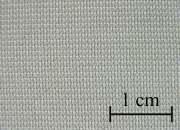Difference between revisions of "Tricot"
Jump to navigation
Jump to search
(username removed) |
(username removed) |
||
| Line 2: | Line 2: | ||
== Description == | == Description == | ||
| − | A run-resistant warp-knit fabric. Tricot knitting was developed in England in 1775 by Crane. It is now the most common type of warp-knit fabric. It is made from synthetic ([http://cameo.mfa.org/materials/fullrecord.asp?name=nylon | + | A run-resistant warp-knit fabric. Tricot knitting was developed in England in 1775 by Crane. It is now the most common type of warp-knit fabric. It is made from synthetic ([http://cameo.mfa.org/materials/fullrecord.asp?name=nylon%20fiber nylon], [http://cameo.mfa.org/materials/fullrecord.asp?name=acetate%20fiber acetate], [http://cameo.mfa.org/materials/fullrecord.asp?name=polyester%20fiber polyester], [http://cameo.mfa.org/materials/fullrecord.asp?name=rayon%20fiber rayon], etc. ) and occasionally natural ([http://cameo.mfa.org/materials/fullrecord.asp?name=wool wool], [http://cameo.mfa.org/materials/fullrecord.asp?name=silk silk]) fibers. Tricot knits are soft with good crease resistant and elasticity. They are used for clothing and lingerie. |
== Synonyms and Related Terms == | == Synonyms and Related Terms == | ||
Revision as of 06:48, 24 July 2013
Description
A run-resistant warp-knit fabric. Tricot knitting was developed in England in 1775 by Crane. It is now the most common type of warp-knit fabric. It is made from synthetic (nylon, acetate, polyester, rayon, etc. ) and occasionally natural (wool, silk) fibers. Tricot knits are soft with good crease resistant and elasticity. They are used for clothing and lingerie.
Synonyms and Related Terms
punto (Esp.)
Additional Information
M. Joseph, Introductory Textile Science, Holt Reinhold & Winston, Fort Worth, 1986.
